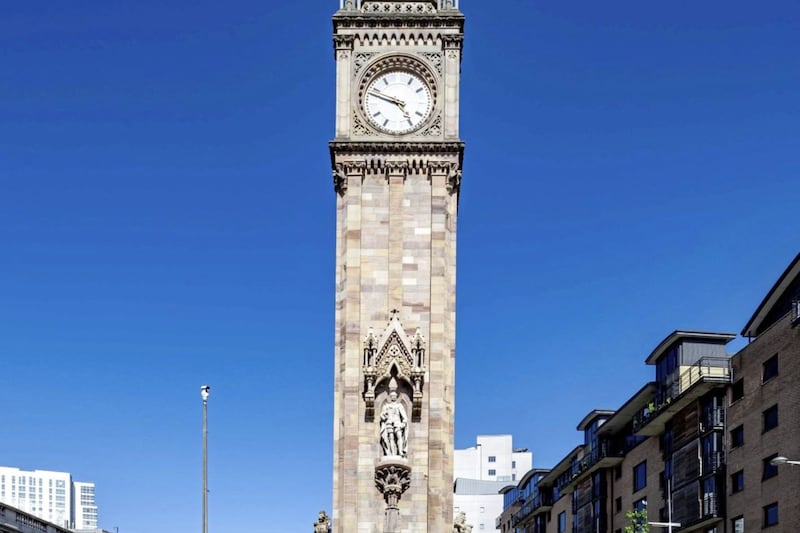BOOK OF THE WEEK
Young & Mackenzie, Architects of Ulster by Paul Harron, published by the Ulster Architectural Heritage Society, priced £28
PAUL Harron has written a remarkable book. Not only is it a valuable record for those interested in the architecture of Northern Ireland in general and Belfast in particular, it’s also a fascinating look at the buildings designed by local firm Young & Mackenzie and the three generations of the Young family who left a legacy of outstanding beauty.
Robert Young Senior founded the firm at the end of the 1800s, having studied architecture in Glasgow, and determined to lift Belfast out of its "mean and shabby" appearance with grand shops and offices, churches and villas. Initially being a very Presbyterian company, their portfolio included the Assembly Buildings in Fisherwick Place, described as a ‘parliament’, now a conference centre; Robinson & Cleaver with its great sweeping staircase and elevators, veranda for ladies to promenade and embellishment in stone and bronze; they created Anderson & McAuley’s; the Scottish Provident Buildings and Ocean Building on the other side of Donegall Square.
When the third generation married into a Quaker family, the company began looking beyond Presbyterian structures, especially towards Methodist churches, and there are fine examples on Newtownards Road, Springfield Road and in Cavehill Road Methodist, described by Harron as having "swept roofs possessing a certain Scandinavian air".
From red brick warehouses to Magee University, to a cemetery to the new mansion that became the Culloden Hotel "overhanging Belfast Lough", to a town hall in Co Donegal to Cunningham Memorial in Cullybackey, principally funded by two wealthy twin unmarried sisters, it seems to me no matter where you are there’s a Young & Mackenzie design to admire.
Stand in the grounds of Belfast City Hall and everywhere you turn there is a wonderful example of their vision and professionalism. This is a fascinating book, full of surprises and a credit to the author.
Anne Hailes
The Heart's Invisible Furies by John Boyne, published in hardback by Doubleday
Dublin writer Boyne's latest foray into the story of Ireland is much funnier but no less hard-hitting in its social backdrop than his previous novels, including A History Of Loneliness.
It centres on the lifelong trials and tribulations of Cyril Avery, a boy born in 1945 out of wedlock to an Irish mother, who is disgraced by the church and those around her.
Adopted by a pair of middle-class Dublin eccentrics, he strikes up a friendship with a spoilt, risky character, Julian Woodbead. That friendship provides the link through much of Cyril's life, told in the first person, in which he comes to terms with being gay in a country, that, until recently scorned homosexuality, his ill-fated relationships, the savagery of the church, the scourge of Aids and other real events which provide a backdrop to the story.
But Boyne creates lightness out of doom, humour out of desperately sad situations and environments, creating a compelling page-turner that really tells the story of Ireland, as well as of a man trying to anchor himself in world with decidedly questionable values. A terrific read.
Hannah Stephenson
A Gentleman In Moscow by Amor Towles, published in hardback by Hutchinson
Described as The Grand Budapest Hotel meets War And Peace, A Gentleman In Moscow is quite a novel to behold. Towles' use of language is an absolute pleasure to read and you can't help but savour every last word.
The story opens a couple of years after the Russian Revolution, during a time of ferocious upheaval. A devilishly good-looking count, Alexander Rostov has been summoned before an emergency committee and accused of penning a counter revolutionary poem. For the next several years, under hotel arrest, he forms relationships with employees, visitors and a young girl whom he becomes a guardian for.
Almost overly wordy at points, Towles spends a lot of time on detailed descriptions of Rostov and his various encounters, but you can't help but enjoy the ride. What makes it a great work of historical fiction are the apt creations the author builds outside the hotel walls in a truly tumultuous time.
Towles creates such a memorable character in Rostov and this book brings something for everyone - humour, history, friendship and philosophy. Definitely worth a read.
Heather Doughty




